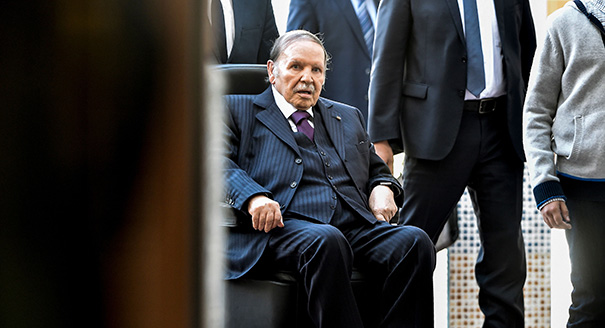In Algeria, the prospect of a fifth term for President Abdelaziz Bouteflika in the presidential election next year has been hovering for months. Last April, the general secretary of the National Liberation Front (FLN), Djamel Ould Abbes, called on the ailing 81-year-old president to “pursue his mission of development and reform of the country started since 1999.” After months of speculation, it seems increasingly obvious that Bouteflika, who has been in office for 19 years, will run once again.
Civil society figures have mobilized against the move, writing an open letter to the president and asking him to give up on the idea of another term to allow the country to effect a transition that would permit the “building of solid and legitimate institutions.” However, maintaining the status quo serves different interests and political actors. This is facilitated by the fact that Algerian military and political elites have succeeded in neutralizing their opponents, because opposition parties have often failed to present coherent alternatives to parties backed by the country’s leaders. The opposition has tended to behave in counterproductive ways, allowing the regime to keep things as they are.
The main shortcoming of Algerian opposition parties is their lack of commitment to democratic principles and internal competition. Their leaderships and programs have generally remained unchanged. Most Algerian parties, including opposition parties, have a dominant figure, either the party founder or cofounder, who is rarely challenged successfully in party elections. A notable example is the Socialist Forces Front, founded by Hocine Aït Ahmed. He remained party leader for half a century, even though for a large part of that time he lived in exile in Switzerland. Public criticism was not tolerated and the party was shaken by several crises in the last two decades due to an absence of transparency and internal consultation. In other words, a party pushing for a more democratic Algeria couldn’t implement democratic principles within its own ranks.
Similarly, the programs of opposition parties have reflected little ambition for promoting change. They have not presented initiatives for ameliorating the conditions of Algerian citizens, fostering new values, or engaging in innovative forms of political action. Instead, the Algerian opposition has perpetuated the rules of the game, reproducing the same patterns of undemocratic behavior that they have decried in parties close to the regime.
A third shortcoming of opposition parties is that they are focused on preserving their relationship with the regime rather than finding ways to advance the interests of society. The quest for power seems to be the only objective of the opposition. Their activism has not been a struggle for democratization and a better future, but a way to gain access to ministerial portfolios, parliamentary seats, high positions, and the distribution of rents through substantial salaries and other benefits. These benefits have created bonds of loyalty between opposition figures and the regime. Among many Algerians there is a feeling that opposition parties often remain uncommitted to having a tangible political impact, instead reappearing only when electoral deadlines loom. As a result, their standing has fallen in the eyes of their constituencies. This has restricted their popular appeal and capacity for public engagement, which is why opposition parties have been unable to rally citizens, who do not believe in the usefulness of their work, share their values, or even trust them.
Not surprisingly, according to the 2017 Arab Barometer politicians are viewed negatively by Algerians. Asked to rank politicians’ honesty on a seven-point scale with 1 representing the most dishonest, more than half of the 1,200 respondents rated politicians as a 1 (28 percent) or a 2 (25 percent). Political parties and parliament are the least trusted political institutions, with only 14 percent of respondents trusting parties against 17 percent for parliament. Consequently, in the 2017 parliamentary elections, the participation rate was only 35 percent.
Political actors, including parliamentarians, are coopted in a variety of ways and at different levels depending on the resources available to the regime. For instance, in 2008 a presidential decree raised parliamentarians’ monthly salary from $1,500 to $2,400. The new salary was twenty times the legally mandated minimum monthly salary in Algeria at the time, and around fourteen times what it is today—approximately $170—all for not holding the government accountable.
This cooptation allowed parliamentarians to climb the social ladder and improve their socio-economic status. Yet their entry into the corridors of power also let them make contact and build ties with other influential people, especially from the business world. This, in turn, gave them the opportunity to extend patronage to their electors and networks of political clients, whether from the same social groups, regions, or tribes as them, by interceding on their behalf and allowing them to also benefit from oil rents.
As a result, what exists today in Algeria is no longer the single-party system once dominated by the FLN, but rather a multiparty system made up of parties that behave as if they were functioning in a one-party system. Opposition parties are incapable of developing nation-wide agendas that can bridge the geographic, ethnic, and linguistic fractures that continue to divide Algerians. The main consequence of this fragmentation is that opposition parties cannot and will not challenging the system. Rather, they embody its personalism and patron-client relationships. There is no possibility for a political alternation in Algeria, which is why the country’s forthcoming presidential election will likely be a non-event.






